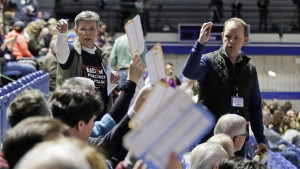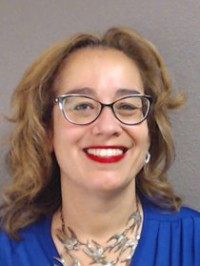Audio Transcript
Sam Bouman 0:17
The primary season for Democratic candidates for president officially began yesterday but with a less than auspicious start. Monday was the Iowa caucus. Iowa is the first state in the nation to have it say in the presidential nominating process. The results of that caucus have been have taken an unusually long time to process. A disastrous series of events including a faulty app and overloaded phone lines meant that the Democratic Party didn't announce the final results until late today. We have a caucus expert here on the line with us today. Christine Kramar is a Portland native and has worked many a caucus in the past. In 2016. She was an impartial observer in the Nevada caucus and these days, she is coordinating a Medicare for all delegate network to attend the Democratic National Convention and back the candidate who is most likely to fulfill the pledge for universal health care. Christine, thank you for being with us.
We're going to work on getting Christine on the line here for a second. So just to run down some of the results that we have so far, I believe the leader so far with 62% reporting is Pete Buttigieg with 26.9%. And Sanders was next, right Yasemin?
Yasemin Cobanoglu 1:33
Yep, followed by Bernie Sanders with 25.1%. So they both have 10 delegates each. And then after that, we have Elizabeth Warren, with 18.3% and four delegates, followed by Joe Biden with 15.6% and zero delegates. So I think that's been kind of an interesting turnout. And then even after that, we have Amy Klobuchar with 12.6%. And then Andrew Yang with 1% and then we know Michael Bloomberg, Tom Styer, Deval Patrick, John Delaney, Tulsi Gabbard, they all have about zero percent support.
Sam Bouman 2:10
And that's just as of right now and we're expecting more results to pour in as the day goes by, and I believe on the Republican end of things, it's pretty much as predicted. The President has kind of run away with it a bit, ahead of his two opponents.
Yasemin Cobanoglu 2:29
Yeah, on the Republican side, it's, of course, Donald Trump with 97.1% and 39 delegates. And then the only other person that actually got a delegate on the Republican side was one for Bill Weld with 1.3% of the vote. And then Joe Walsh, has 1.1% but with zero delegates. And so coming up after this, I think what people are looking towards is New Hampshire, which will be next Tuesday. It's kind of interesting that what everyone thought would be the front runner, Joe Biden actually has turned out not to be the front runner.
Sam Bouman 3:08
Yeah. And I know that Sanders especially had a really good ground game and- in Iowa this year, and it looks like that's paid off quite a bit. I know he was expected to be down in the rankings a little bit.
Yasemin Cobanoglu 3:24
Yeah, I mean, the ground support for Bernie Sanders across the country has been pretty amazing. So it's interesting to me that Buttigieg actually was able to overtake him in this and also the lack of support, I think for Warren and Biden is interesting when you compare how different their policies are to each other.
Sam Bouman 3:46
Yeah. And do we have Christine Kramar on the line right now?
Christine Kramar 3:51
Yes, I'm on the line.
Sam Bouman 3:53
Hi, Christine. Welcome to the KBOO Evening News.
Christine Kramar 3:57
Thank you. I just got back from three and a half weeks in Iowa.
Sam Bouman 4:00
Wow. So I guess let's jump right in. What do you see is- what- what went wrong with the caucus last night with the counting?
Christine Kramar 4:10
Okay, so one of the things is, is that the Iowa State Democratic Party is in a no win position to decide to release that first set of caucus results, that tabulation method, they have to use that method consistently throughout the entire process. So if they started reporting 2% of caucus locations, or 10% of caucus locations, or now they've released 60% of caucus locations, they have to make sure that their audit trail was consistent that entire period. So that can create a situation where the leadership hesitates to release that information. I was working in Iowa and I was training precinct captains on using the app. There was a lot of uncertainty, the average age of the precinct captains using the app or was in their 70s. The Democratic Party switching to, in this dependence on technology versus that- we used to have methods we've been conducting the caucuses using a paper trail for years, of using, of having a backup plan. And that way is one of the failures that- that happened that night. And we also have this 24 hour news cycle where everyone's waiting and expecting results immediately. And that's never how it's been with the Iowa caucus. I can recall caucuses, my first caucus was in 1992. We went several hours into the evening and people really didn't expect to hear it in the new cycle until the next morning. So some of that is just this over dependence on the 24 hour news cycle that places pressure on people who are primarily volunteers, unpaid volunteers within a political organization to perform when the eyes the world are watching them.
Yasemin Cobanoglu 5:53
So in the whole scheme of things, how do the issues at the Iowa caucus last night compare?
Christine Kramar 5:57
I actually would like to praise the Iowa State Democratic Party for not jumping the gun and releasing information too early that they would have to walk back. That in comparison to things that could have gone wrong, their data, number one did not get corrupted. They did not demonstrate any bias toward or against a single candidate. And we didn't have results coming out of Iowa where people were reporting erroneous coin tosses as the matter of how caucuses were determined. Part of that was that because we have this- two top candidates, we had five candidates at the top, all vying for attention, so that eliminated that story to some degree, but I think that they did the right thing in being prudent despite the pressure from the campaigns and from the media.
Sam Bouman 6:50
And not- not all primary contests are decided by a caucus and I mean Iowa is, Nevada is, but many of them are done with the primary ballot. Can you just give us a little rundown of how caucus results are decided?
Christine Kramar 7:06
So caucus- the caucuses depend on a formula, of 15% of the individuals to show up for a caucus meeting in a precinct and a precinct is the smallest governmental jurisdictional district that exists in every community. So you would go to your neighborhood precinct, have a meeting, and 15- 15% of your neighbors needs to show up in support of their particular candidate, to make them viable. And that number of 15% is 15% of the turnout, which is extraordinarily difficult. Getting people to turn out for a caucus is hard because you're telling people unlike voting, show up at a specific time and a specific place, and we don't know how long the caucus meeting is going to last. In the past, we've had caucus meetings go on when the party is still out several realignments until one or two o'clock in the morning. So one of the things, it is very, very different is that you do not know what that 15% number is as a candidate that you need to hit in a particular neighborhood because much of that turnout can sway based on weather and the weather is very different in Iowa. While I was there at one point, we had a severe snowstorm where I was hunkered in my hotel room for two days. Whereas on caucus day, it was a balmy 43 degrees and the sun was out. And that indicated a high turnout number and so many of these candidates suffered because they would have done better has there been a snowstorm because it would have been more of a true believers coming out versus more casual caucus goers.
Yasemin Cobanoglu 8:44
And so the numbers so far that we have with 62% reporting, it shows Buttigieg with 26.9 and Sanders with 25.1%. What do you think that means for the these candidates going into the New Hampshire primary and the rest of the primary season in general?
Christine Kramar 9:02
I don't really see it as something significant that the overall number of delegates that are selected in Iowa are less than 2% of the total number of delegates needed at the National Convention. Caucuses in general, are media events, they're undemocratic. They're- there's a lot of gamesmanship in them, they're political theater, frankly, that all they turn into is a fundraising email in the end, especially with this many candidates all vying for delegates, as I see it, as each of the campaigns are going to put their own spin on it. Even people who are buried at the very, very bottom are claiming that perhaps there's momentum coming out of these caucuses, I think that we're really not going to see the framework of who the next Democratic Party nominee will be until after March 5, which is Super Tuesday.
Sam Bouman 9:57
Yeah, and going forward from the Iowa caucuses, the DNC so far hasn't announced any plans to change the app that it used, at least for the Nevada caucus. Do you know what motivated the DNC? Oh, go ahead, sorry.
Christine Kramar 10:12
Okay, so the DNC-this is a particular point, the DNC does not control the caucuses. What happens is each state that holds a caucus or primary submits to the DNC a document called the delegate selection plan. The DNC members of its rules committee adopt or reject that delegate selection plan by each state. So the decision for that particular app and that particular vendor is made by the all volunteer unpaid individuals elected to positions within the Iowa State Democratic Party and the Nevada State Democratic Party.
Sam Bouman 10:50
And I had also heard that after what happened last night with the- the troubles with the app and getting results out, there's a lot of talk about the caucuses, possibly ending through legislative action at the state level in Iowa. Have you heard anything about that?
Christine Kramar 11:10
I've not heard anything about that. I personally, after the 2016 cycle, sought to get Nevada to eliminate its caucus. And frankly, because consultants makes so much money off of these caucuses, the advertising dollars generated by these caucuses, there's a lot more political pressure on politicians to retain the caucuses, because everyone is taking a little piece of the pie and wetting their beak in this process, that if they were concerned about it being the most democratic and fair, we would have eliminated caucuses a generation ago. We did fight to try to eliminate caucuses in- after 2016. The DNC Rule Committee went in to that. But again, the consultants, which are many of the people who are making the Democratic Party not democratic, they enjoy the caucuses because if you look at their billing coming out of caucus states, they're the ones who benefit from it, not the voters.
Yasemin Cobanoglu 12:10
Well, thank you so much for talking with us, Christine. We've been speaking with Christine Kramar, the executive director of the Medicare for All Delegates Detwork. More information is available on her Twitter at Christine Kramar and online at Medicareforalldelegatesnetwork.com. For KBOO News in Depth. I'm Yasemin Cobanoglu.
Sam Bouman 12:28
And I'm Sam Bouman.
Transcribed by https://otter.ai




